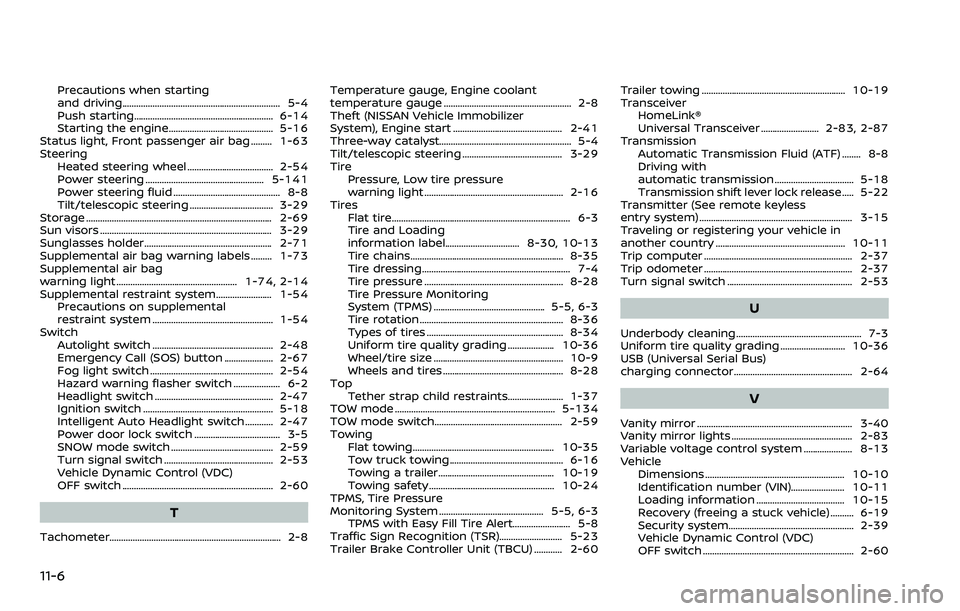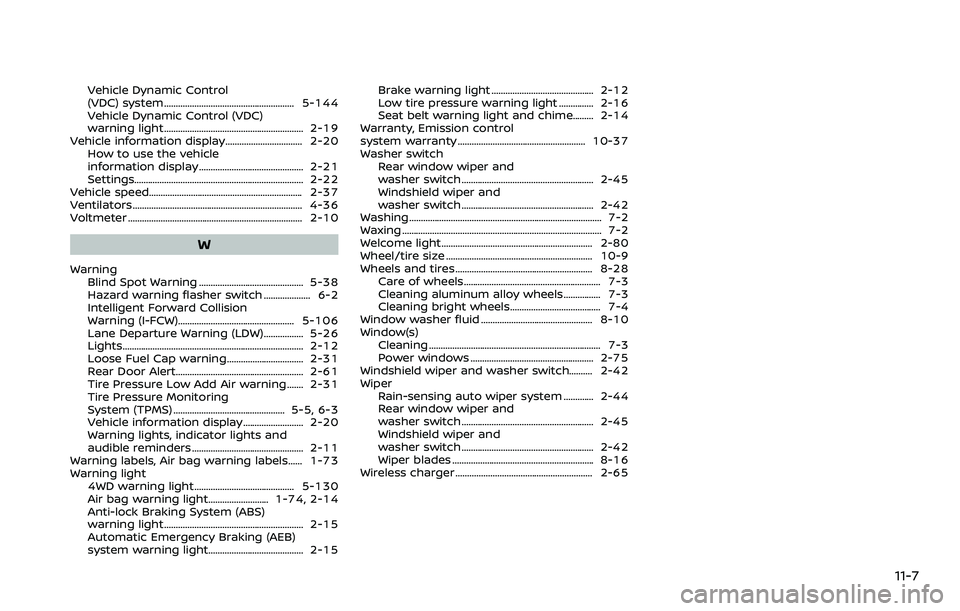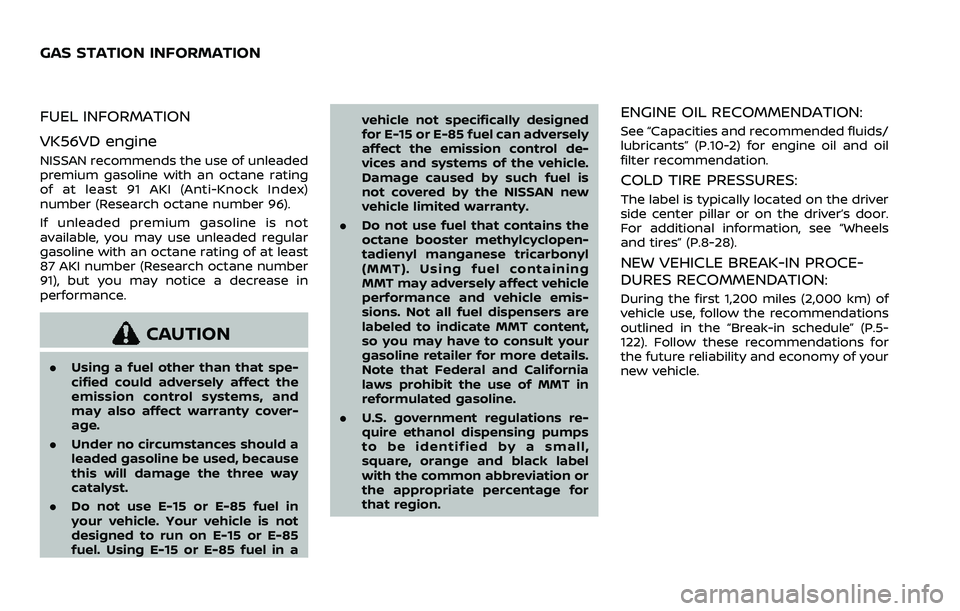2022 NISSAN ARMADA tires
[x] Cancel search: tiresPage 581 of 604

.Do not modify the vehicle ex-
haust system, brake system, etc.
. Do not attach any additional
hitches to your vehicle because
a hitch is already mounted to
your vehicle frame.
Tire pressures
.When towing a trailer, inflate the
vehicle tires to the recom-
mended cold tire pressure indi-
cated on the Tire and Loading
Information label.
. Trailer tire condition, size, load
rating and proper inflation pres-
sure should be in accordance
with the trailer and tire manu-
facturers’ specifications.
Safety chains
Always use a suitable chain between your
vehicle and the trailer. The safety chains
should be crossed and should be at-
tached to the hitch, not to the vehicle
bumper or axle. Be sure to leave enough
slack in the chains to permit turning
corners.
STI0745
Trailer lights (if so equipped)
Your vehicle is equipped with a towing
package, which also includes the 7-pin
trailer harness connector located under
the trailer hitch cover on the rear bumper.
CAUTION
. When splicing into the vehicle
electrical system, a commercially
available power-type module/
converter must be used to pro-
vide power for all trailer lighting.
This unit uses the vehicle battery
as a direct power source for all trailer lights while using the ve-
hicle tail light, stoplight and turn
signal circuits as a signal source.
The module/converter must draw
no more than 15 milliamps from
the stop and tail lamp circuits.
Using a module/converter that
exceeds these power require-
ments may damage the vehicle’s
electrical system. See a reputable
trailer retailer to obtain the prop-
er equipment and to have it
installed.
. Do not connect electrical devices
that draw more than 40 amps to
the vehicle. The fusible link may
melt.
Trailer lights should comply with federal
and/or local regulations. For assistance in
hooking up trailer lights, contact a NISSAN
dealer or reputable trailer retailer.
Trailer brakes
When towing a trailer load of 3,500 lbs.
(1,587 kg) or more, trailers with a brake
system MUST be used. However, most
states require a separate braking system
on trailers with a loaded weight above a
specific amount. Make sure the trailer
meets the local regulations and the
regulations where you plan to tow.
Technical and consumer information10-27
Page 590 of 604

10-36Technical and consumer information
DOT (Department Of Transportation)
Quality Grades: All passenger car tires
must conform to federal safety require-
ments in addition to these grades.
Quality grades can be found where ap-
plicable on the tire sidewall between
tread shoulder and maximum section
width. For example:
Treadwear 200 Traction AA Tempera-
ture A
TREADWEAR
The treadwear grade is a comparative
rating based on the wear rate of the tire
when tested under controlled conditions
on a specified government test course.
For example, a tire graded 150 would
wear one and one-half (1 1/2) times as
well on the government course as a tire
graded 100. The relative performance of
tires depends upon actual conditions of
their use, however, and may depart sig-
nificantly from the norm due to variations
in driving habits, service practices and
differences in road characteristics and
climate.
TRACTION AA, A, B AND C
The traction grades, from highest to low-
est, are AA, A, B and C. Those grades
represent the tire’s ability to stop on wet
pavement as measured under controlled
conditions on specified government test
surfaces of asphalt and concrete. A tire
marked C may have poor traction perfor-
mance.
WARNING
The traction grade assigned to this
tire is based on straight-ahead brak-
ing traction tests, and does not
include acceleration, cornering, hy-
droplaning, or peak traction charac-
teristics.
TEMPERATURE A, B AND C
The temperature grades A (the highest),
B, and C, representing the tire’s resistance
to the generation of heat and its ability to
dissipate heat when tested under con-
trolled conditions on a specified indoor
laboratory test wheel. Sustained high
temperature can cause the material of
the tire to degenerate and reduce tire life,
and excessive temperature can lead to
sudden tire failure. The grade C corre-
sponds to a level of performance whichall passenger car tires must meet under
the Federal Motor Vehicle Safety Stan-
dard No. 109. Grades B and A represent
higher levels of performance on the
laboratory test wheel than the minimum
required by law.
WARNING
The temperature grade for this tire is
established for a tire that is properly
inflated and not overloaded. Exces-
sive speed, under-inflation, or exces-
sive loading, either separately or in
combination, can cause heat build-
up and possible tire failure.
UNIFORM TIRE QUALITY GRADING
Page 600 of 604

11-6
Precautions when starting
and driving.................................................................... 5-4
Push starting............................................................ 6-14
Starting the engine............................................. 5-16
Status light, Front passenger air bag ......... 1-63
Steering Heated steering wheel ..................................... 2-54
Power steering ................................................... 5-141
Power steering fluid .............................................. 8-8
Tilt/telescopic steering .................................... 3-29
Storage ........................................................................\
........ 2-69
Sun visors ........................................................................\
.. 3-29
Sunglasses holder....................................................... 2-71
Supplemental air bag warning labels ......... 1-73
Supplemental air bag
warning light .................................................... 1-74, 2-14
Supplemental restraint system........................ 1-54 Precautions on supplemental
restraint system .................................................... 1-54
Switch Autolight switch .................................................... 2-48
Emergency Call (SOS) button ..................... 2-67
Fog light switch ..................................................... 2-54
Hazard warning flasher switch .................... 6-2
Headlight switch ................................................... 2-47
Ignition switch ........................................................ 5-18
Intelligent Auto Headlight switch ............ 2-47
Power door lock switch ..................................... 3-5
SNOW mode switch ............................................ 2-59
Turn signal switch ............................................... 2-53
Vehicle Dynamic Control (VDC)
OFF switch ................................................................. 2-60
T
Tachometer........................................................................\
.. 2-8 Temperature gauge, Engine coolant
temperature gauge ....................................................... 2-8
Theft (NISSAN Vehicle Immobilizer
System), Engine start ............................................... 2-41
Three-way catalyst......................................................... 5-4
Tilt/telescopic steering ........................................... 3-29
Tire
Pressure, Low tire pressure
warning light ............................................................ 2-16
Tires Flat tire........................................................................\
..... 6-3
Tire and Loading
information label................................ 8-30, 10-13
Tire chains.................................................................. 8-35
Tire dressing................................................................ 7-4
Tire pressure ............................................................ 8-28
Tire Pressure Monitoring
System (TPMS) ................................................ 5-5, 6-3
Tire rotation.............................................................. 8-36
Types of tires ........................................................... 8-34
Uniform tire quality grading .................... 10-36
Wheel/tire size ........................................................ 10-9
Wheels and tires .................................................... 8-28
Top Tether strap child restraints........................ 1-37
TOW mode ..................................................................... 5-134
TOW mode switch....................................................... 2-59
Towing Flat towing............................................................. 10-35
Tow truck towing................................................. 6-16
Towing a trailer.................................................. 10-19
Towing safety...................................................... 10-24
TPMS, Tire Pressure
Monitoring System ............................................. 5-5, 6-3 TPMS with Easy Fill Tire Alert......................... 5-8
Traffic Sign Recognition (TSR)........................... 5-23
Trailer Brake Controller Unit (TBCU) ............ 2-60 Trailer towing .............................................................. 10-19
Transceiver
HomeLink®
Universal Transceiver ......................... 2-83, 2-87
Transmission Automatic Transmission Fluid (ATF) ........ 8-8
Driving with
automatic transmission .................................. 5-18
Transmission shift lever lock release ..... 5-22
Transmitter (See remote keyless
entry system) .................................................................. 3-15
Traveling or registering your vehicle in
another country ........................................................ 10-11
Trip computer ................................................................ 2-37
Trip odometer ................................................................ 2-37
Turn signal switch ...................................................... 2-53
U
Underbody cleaning ...................................................... 7-3
Uniform tire quality grading ............................ 10-36
USB (Universal Serial Bus)
charging connector................................................... 2-64
V
Vanity mirror ................................................................... 3-40
Vanity mirror lights .................................................... 2-83
Variable voltage control system ..................... 8-13
Vehicle Dimensions ............................................................ 10-10
Identification number (VIN)....................... 10-11
Loading information ...................................... 10-15
Recovery (freeing a stuck vehicle) .......... 6-19
Security system...................................................... 2-39
Vehicle Dynamic Control (VDC)
OFF switch ................................................................. 2-60
Page 601 of 604

Vehicle Dynamic Control
(VDC) system ........................................................ 5-144
Vehicle Dynamic Control (VDC)
warning light ............................................................ 2-19
Vehicle information display................................. 2-20 How to use the vehicle
information display ............................................. 2-21
Settings........................................................................\
. 2-22
Vehicle speed.................................................................. 2-37
Ventilators ........................................................................\
. 4-36
Voltmeter ........................................................................\
... 2-10
W
Warning Blind Spot Warning ............................................. 5-38
Hazard warning flasher switch .................... 6-2
Intelligent Forward Collision
Warning (I-FCW).................................................. 5-106
Lane Departure Warning (LDW) ................. 5-26
Lights..................................................................\
............ 2-12
Loose Fuel Cap warning................................. 2-31
Rear Door Alert....................................................... 2-61
Tire Pressure Low Add Air warning ....... 2-31
Tire Pressure Monitoring
System (TPMS) ................................................ 5-5, 6-3
Vehicle information display.......................... 2-20
Warning lights, indicator lights and
audible reminders ................................................ 2-11
Warning labels, Air bag warning labels...... 1-73
Warning light 4WD warning light ........................................... 5-130
Air bag warning light.......................... 1-74, 2-14
Anti-lock Braking System (ABS)
warning light ............................................................ 2-15
Automatic Emergency Braking (AEB)
system warning light......................................... 2-15 Brake warning light ............................................ 2-12
Low tire pressure warning light ............... 2-16
Seat belt warning light and chime......... 2-14
Warranty, Emission control
system warranty ....................................................... 10-37
Washer switch Rear window wiper and
washer switch ......................................................... 2-45
Windshield wiper and
washer switch ......................................................... 2-42
Washing........................................................................\
........... 7-2
Waxing ........................................................................\
.............. 7-2
Welcome light................................................................. 2-80
Wheel/tire size ............................................................... 10-9
Wheels and tires ........................................................... 8-28 Care of wheels........................................................... 7-3
Cleaning aluminum alloy wheels ................ 7-3
Cleaning bright wheels....................................... 7-4
Window washer fluid ................................................ 8-10
Window(s) Cleaning ........................................................................\
.. 7-3
Power windows ..................................................... 2-75
Windshield wiper and washer switch.......... 2-42
Wiper Rain-sensing auto wiper system ............. 2-44
Rear window wiper and
washer switch ......................................................... 2-45
Windshield wiper and
washer switch ......................................................... 2-42
Wiper blades ............................................................. 8-16
Wireless charger ........................................................... 2-65
11-7
Page 602 of 604

FUEL INFORMATION
VK56VD engine
NISSAN recommends the use of unleaded
premium gasoline with an octane rating
of at least 91 AKI (Anti-Knock Index)
number (Research octane number 96).
If unleaded premium gasoline is not
available, you may use unleaded regular
gasoline with an octane rating of at least
87 AKI number (Research octane number
91), but you may notice a decrease in
performance.
CAUTION
.Using a fuel other than that spe-
cified could adversely affect the
emission control systems, and
may also affect warranty cover-
age.
. Under no circumstances should a
leaded gasoline be used, because
this will damage the three way
catalyst.
. Do not use E-15 or E-85 fuel in
your vehicle. Your vehicle is not
designed to run on E-15 or E-85
fuel. Using E-15 or E-85 fuel in a vehicle not specifically designed
for E-15 or E-85 fuel can adversely
affect the emission control de-
vices and systems of the vehicle.
Damage caused by such fuel is
not covered by the NISSAN new
vehicle limited warranty.
. Do not use fuel that contains the
octane booster methylcyclopen-
tadienyl manganese tricarbonyl
(MMT). Using fuel containing
MMT may adversely affect vehicle
performance and vehicle emis-
sions. Not all fuel dispensers are
labeled to indicate MMT content,
so you may have to consult your
gasoline retailer for more details.
Note that Federal and California
laws prohibit the use of MMT in
reformulated gasoline.
. U.S. government regulations re-
quire ethanol dispensing pumps
to be identified by a small,
square, orange and black label
with the common abbreviation or
the appropriate percentage for
that region.
ENGINE OIL RECOMMENDATION:
See “Capacities and recommended fluids/
lubricants” (P.10-2) for engine oil and oil
filter recommendation.
COLD TIRE PRESSURES:
The label is typically located on the driver
side center pillar or on the driver’s door.
For additional information, see “Wheels
and tires” (P.8-28).
NEW VEHICLE BREAK-IN PROCE-
DURES RECOMMENDATION:
During the first 1,200 miles (2,000 km) of
vehicle use, follow the recommendations
outlined in the “Break-in schedule” (P.5-
122). Follow these recommendations for
the future reliability and economy of your
new vehicle.
GAS STATION INFORMATION